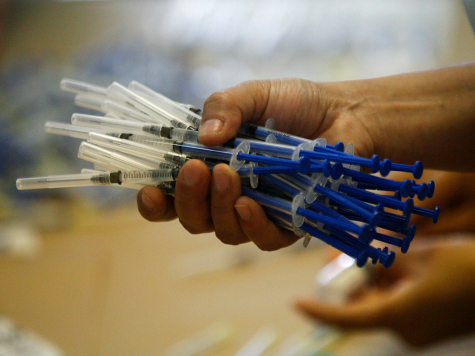The report rocketed around the Internet, trading in equal parts outrage and glee–outrage that the World Health Organization (WHO) and UNICEF might be spiking tetanus shots of poor African women with a sterilizing vaccine, glee that they’d been caught.
Doubts began mounting immediately about charges by the Kenyan Bishops conference that UNICEF and WHO had spiked millions of tetanus vaccines with–in the words of the Kenyan bishops–“the Beta-hCG hormone, which causes infertility and multiple miscarriages” and warned their flock to avoid the tetanus vaccine altogether because of it.
UNICEF and WHO denied the allegations immediately and vehemently.
Professor Giuseppe Benagiano, former head of the reproductive health program at WHO and a frequent collaborator with the pro-life Center for Family & Human Rights (C-Fam), told C-Fam that such a vaccine had been tested by the WHO for years, but the tests failed and no such “birth control vaccine exists.”
Yesterday, Stefano Gennarini of C-Fam interviewed personnel from the Center for Disease Control (CDC) who said combining hCG with a tetanus vaccine would render the hCG homone inoperative.
CDC said, “Because of the adjuvants and preservative contained in tetanus toxoid, it is unlikely that hCG could remain active in a vial of TT. In addition, all vaccines and toxoids are produced in facilities that are under strict quality control conditions and accredited (pre-qualified) by the World Health Organization’s Vaccines and Biologics Department. UNICEF only purchases vaccines and toxoids made by pre-qualified manufacturers.”
When these charges were first made, Dr. Robert Wally of MaterCare International, a group of pro-life OB/GYNs active in Africa, said he suspected the Kenyan doctors were right but that he would have the vials tested in a lab in the United Kingdom. Yesterday, he announced his results and he, too, has gone against the Kenyan bishops.
Walley and two of his MaterCare colleagues announced, “The validity of the vaccine assays performed in the 5 laboratories in Kenya is questionable for 2 reasons: the assays were valid for human serum and not vaccine, and the substance they detected (which is not hCG) varied by a factor of 4000 times between laboratories. Even if the substance assayed was hCG, the levels were so minute that there is no way this could produce antibody levels with a contraceptive effect. If tetanus toxoid vaccines given to millions of women in many countries was [sic] capable of causing infertility there would by now be ample demographic data to confirm this. We know of no such data.”
Dr. Walley and his colleague also debunked similar charges brought in the 1990s. “The Kenya situation mimics what happened in the mid 1990’s in the Philippines, Mexico, Peru, Nicaragua and Tanzania (3). Independent testing of vaccine samples in several reputable laboratories in the 1990’s found no evidence of hCG.”
The CDC told C-Fam, “The presence of HCG in the Mexican and Philippine tests of TT conducted in 1994 was clearly shown by subsequent lab tests to be below the limits of accuracy of the test kits used and was probably related to interference from the adjuvant and preservatives used in the vaccine. The findings of the Mexican and Philippine tests were called “an artifact rather than a true value” by Professor Salvatore Mancuso of the Vatican’s Catholic University of the Sacred Heart.”

COMMENTS
Please let us know if you're having issues with commenting.